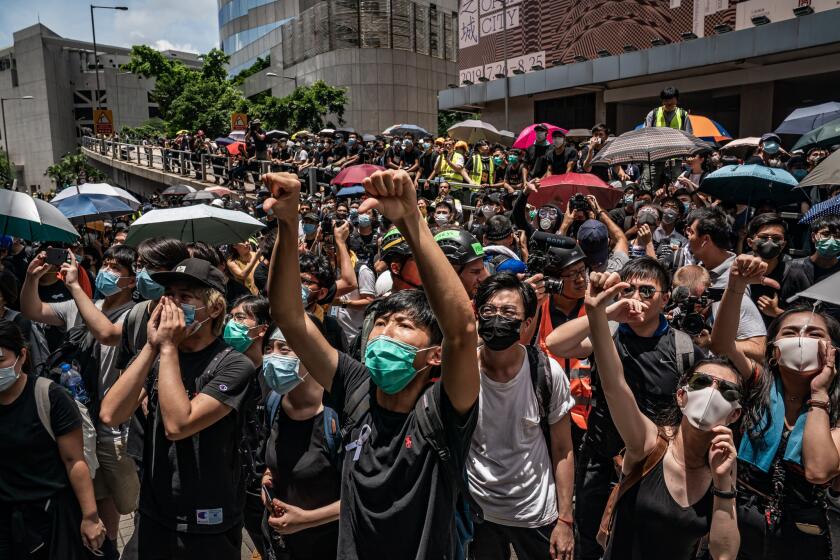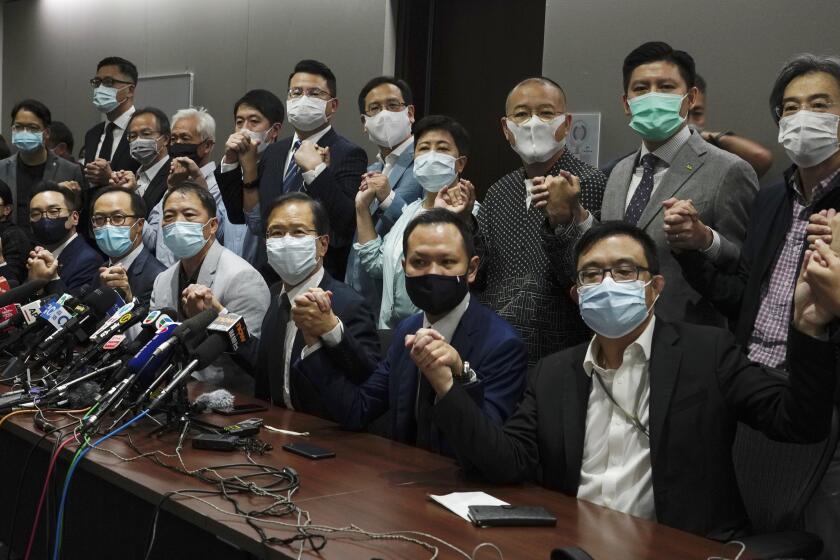Dozens of Hong Kong pro-democracy figures arrested in one of China’s biggest crackdowns
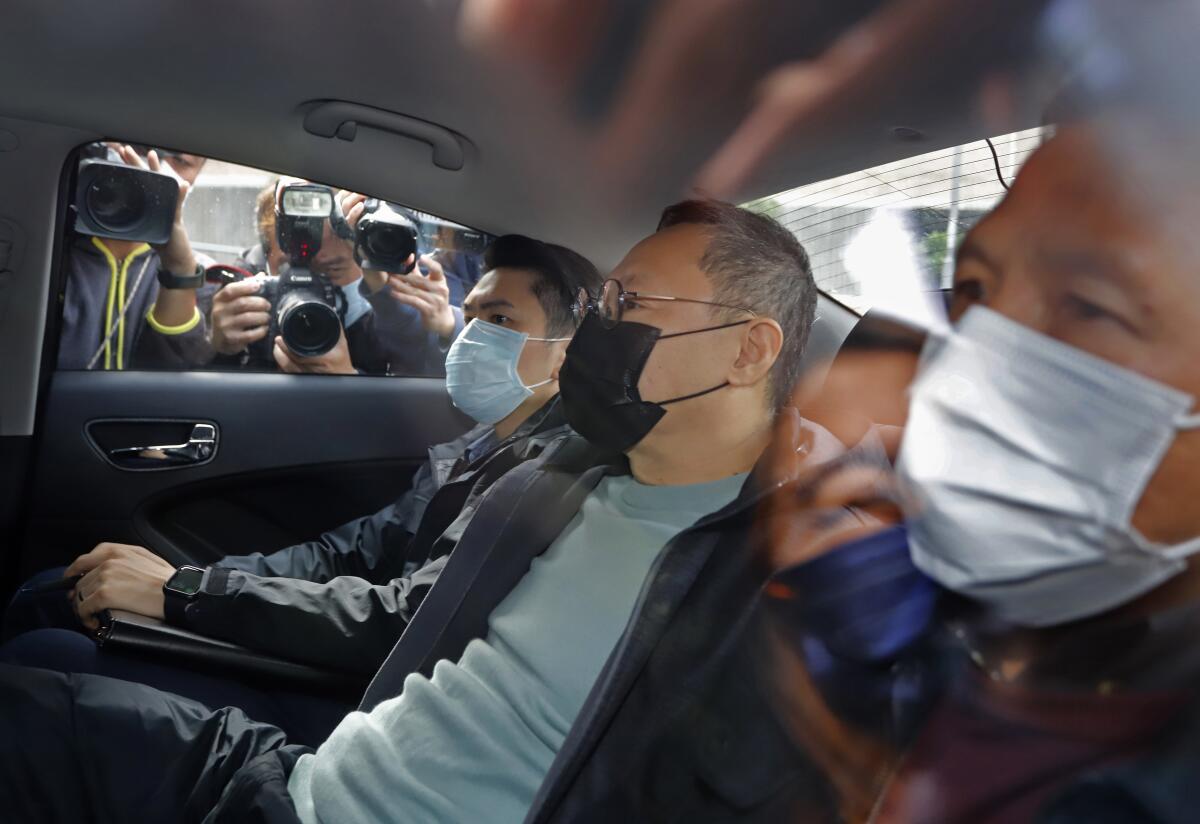
- Share via
HONG KONG — More than 50 former opposition lawmakers and rights activists, including an American lawyer, were arrested in Hong Kong in early-morning sweeps Wednesday on suspicion of violating the city’s national security law, marking one of the biggest crackdowns to date on political dissent in the Asian financial capital.
The raids, which included the arrest of a pollster and warrants to investigate several independent media outlets, highlight Beijing’s determination to transform the semi-autonomous Chinese city at a time when the United States and Europe are distracted by political tumult and the COVID-19 pandemic.
Police said about 1,000 officers fanned out to 72 locations targeting suspects involved in an informal primary held by opposition parties in July to select candidates for legislative elections, which were later postponed by the government.
Chinese officials had warned that the primary was illegal and could violate the new national security law, which has sent a chill across the territory over the past six months by banning, in effect, pro-democracy protests and silencing high-profile critics such as jailed media tycoon Jimmy Lai.
Opposition candidates had hoped to win at least 35 seats in the 70-seat legislature last September in order to be able to veto budgets and challenge pro-Beijing government policies — reasons cited Wednesday by the government as subversive and grounds for arrest.
“People involved are suspected of making use of what they call ‘a 35 plus’ plan ... to some way paralyze the Hong Kong government,” John Lee, Hong Kong’s security secretary, said at a news conference Wednesday.
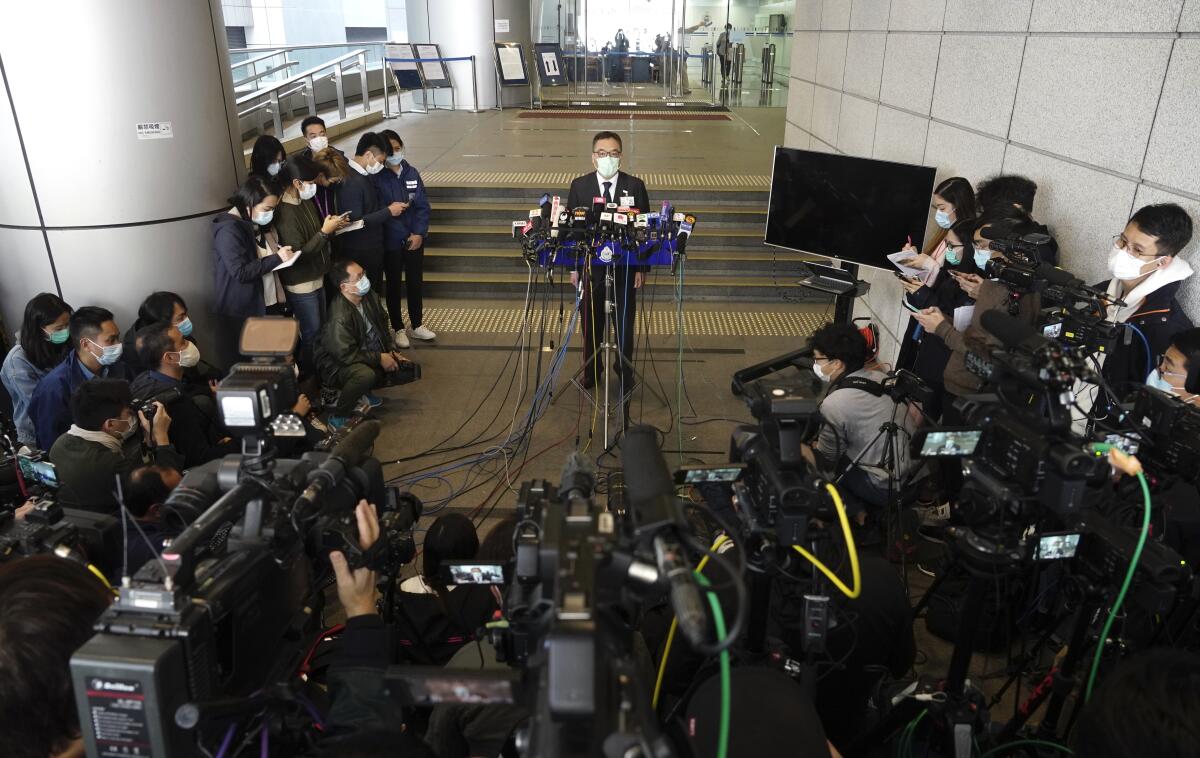
Lee also accused the suspects of developing a “10-step mutual destruction plan” to mobilize supporters to riot and bring Hong Kong to a standstill. Lee appeared to be referring to a prediction by legal scholar Benny Tai, who was among those arrested, of what would happen to Hong Kong if China continued to diminish its autonomy.
Tai helped establish the primary elections and launch the 2014 Occupy Central and Umbrella movements, precursors to the massive protests that swept through Hong Kong in 2019.
Lee said the 600,000 people who merely voted in the primary were not subject to arrest.
Even before Wednesday’s mass arrests, Hong Kong’s legislature has been devoid of any opposition. All 15 lawmakers from the pro-democracy camp quit in November to protest the disqualification of four colleagues accused of “endangering national security.”
China is targeting government opponents through financial institutions using a draconian national security law that’s already led to U.S. sanctions.
The former lawmakers were among those arrested Wednesday, including Wu Chi-wai, Alvin Yeung, Lam Cheuk-ting, Andrew Wan and James To, according to their Facebook pages.
Police also arrested American human rights attorney John Clancey, who assisted with the primary and could become the first foreigner charged under the national security law. The U.S. Consulate in Hong Kong declined to comment.
Clancey was seen being escorted out of his office by police carrying a crutch. When asked by a reporter if he had anything to say to the people of Hong Kong, he responded: “Continue to work for democracy and human rights in Hong Kong.”
Those arrested could face up to 10 years in prison if convicted of violating the national security law, which targets acts of secession, subversion, terrorism and collusion with foreign forces to endanger national security.
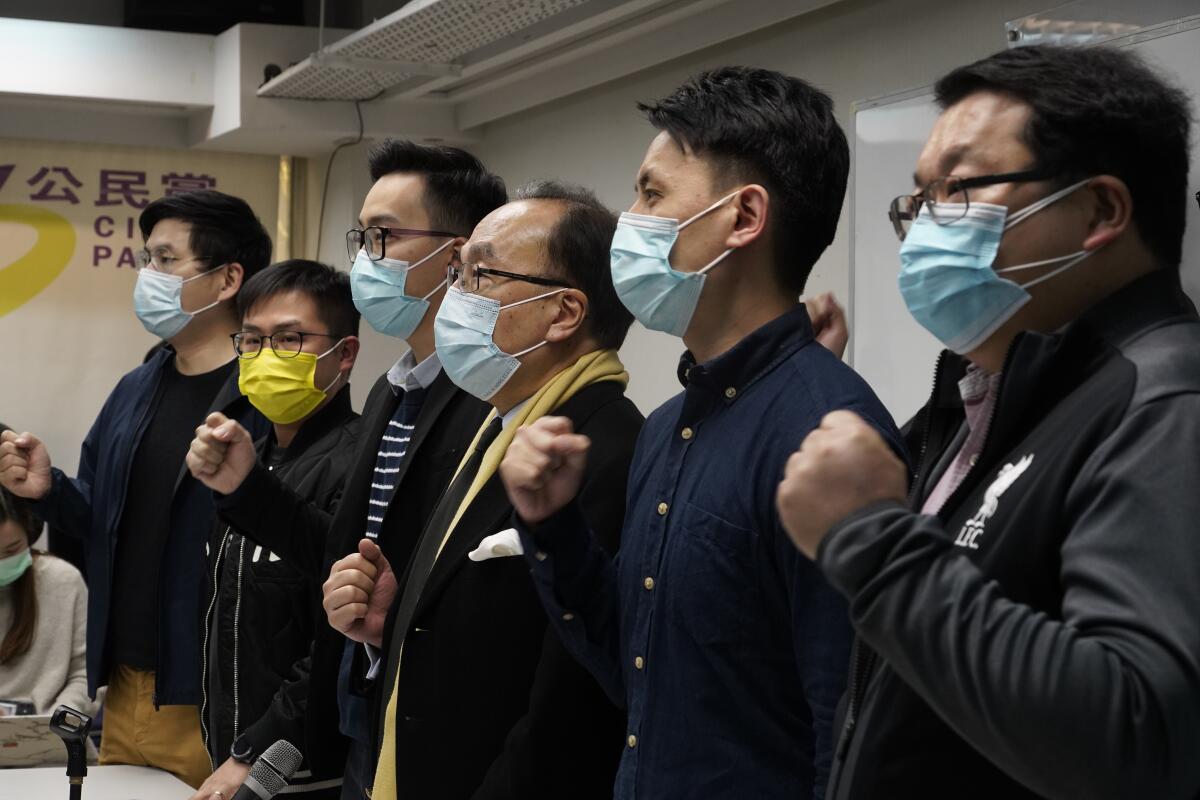
Police also seized Gwyneth Ho, a former journalist-turned-activist, who wrote in an editorial published in the Los Angeles Times last year that Hong Kong must “brace for a new era of deadly repression.”
Maya Wang, senior China researcher at Human Rights Watch, said the arrests removed “the remaining veneer of democracy in the city” and would do little to achieve Beijing’s goals.
“Beijing once again has failed to learn from its mistakes in Hong Kong: that repression generates resistance, and that millions of Hong Kong people will persist in their struggle for their right to vote and run for office in a democratically elected government,” Wang said in a statement.
Long seen as a redoubt of Western living standards and values on the edge of Communist-ruled China, Hong Kong has gradually seen many of its distinctions from the mainland diluted or erased since Britain returned the former colony to China in 1997 under a framework known as “one country, two systems.” Under that agreement, Hong Kong’s autonomy was supposed to be preserved for 50 years, until 2047.
Since the handover, the city’s economy has been overtaken by Shenzhen, the technological and industrial powerhouse across the border. Its independent courts and media are increasingly losing ground under pressure from the national security law.
And the political ferment that fueled major protest movements in 2014 and 2019 alarmed and spurred a backlash from an increasingly belligerent Beijing led by authoritarian President Xi Jinping, who saw the pro-democracy demonstrations as a challenge to Chinese sovereignty and Communist Party rule.
The mass resignation came after Hong Kong’s pro-Beijing government ousted four pro-democracy lawmakers from the city’s Legislative Council.
It remains to be seen what the incoming Biden administration will do to pressure Beijing on Hong Kong, though Antony Blinken, the nominee for secretary of State, said in a tweet that the new White House “will stand with the people of Hong Kong and against Beijing’s crackdown on democracy.”
The Trump administration has been embraced by a segment of the city’s activists, who applauded moves to sanction Chinese and Hong Kong officials.
Those activists are less hopeful about the European Union, which signed a major investment deal with China last week despite withering criticism of China’s treatment of Hong Kong, its continued repression of ethnic Uighurs in the western Chinese province of Xinjiang and its use of “boycott diplomacy” to punish Australia for challenging its policies.
British Foreign Secretary Dominic Raab called the mass arrests “a grievous attack on Hong Kong’s rights and freedoms.”
“These arrests demonstrate that the Hong Kong and Chinese authorities deliberately misled the world about the true purpose of the National Security Law, which is being used to crush dissent and opposing political views,” Raab said. “The U.K. will not turn our backs on the people of Hong Kong.”
To stifle opposition in the city, Hong Kong’s pro-Beijing government has purged teachers who support the democracy movement, jailed journalists and targeted the bank accounts of rights defenders. After welcoming generations of refugees from mainland China over the last century, Hong Kong is now seeing some of its own residents flee for asylum abroad. Others with means have begun immigrating to countries such as Britain to escape the reach of Chinese law.
The anti-government sentiment has been largely driven by younger generations trapped between the legacy of British colonialism and harsh Chinese rule. Many are unsure of how to chart a future in a city with less freedom, fewer jobs and housing prices growing further out of reach.
But in a sign of some of the divisions besetting this city of 7 million people, many of its older residents, especially those with closer ties to the mainland, generally agree with sections of the city’s elite who want a return to political and economic stability.
It’s unclear how China will bring millions of critically minded Hong Kongers to heel without introducing the same draconian measures found on the mainland, such as a strictly censored internet.
Sunny Cheung, a 25-year-old activist now in exile who ran successfully in the primary election, said Beijing was seizing on the U.S. presidential transition to uproot what little democracy remained in the territory.
“The Chinese Communist Party wants to use this gap to purge activists to avoid a backlash from the U.S. and the rest of the world,” he said.
Times staff writer Pierson reported from Singapore and special correspondent Cheung from Hong Kong.
More to Read
Sign up for Essential California
The most important California stories and recommendations in your inbox every morning.
You may occasionally receive promotional content from the Los Angeles Times.
